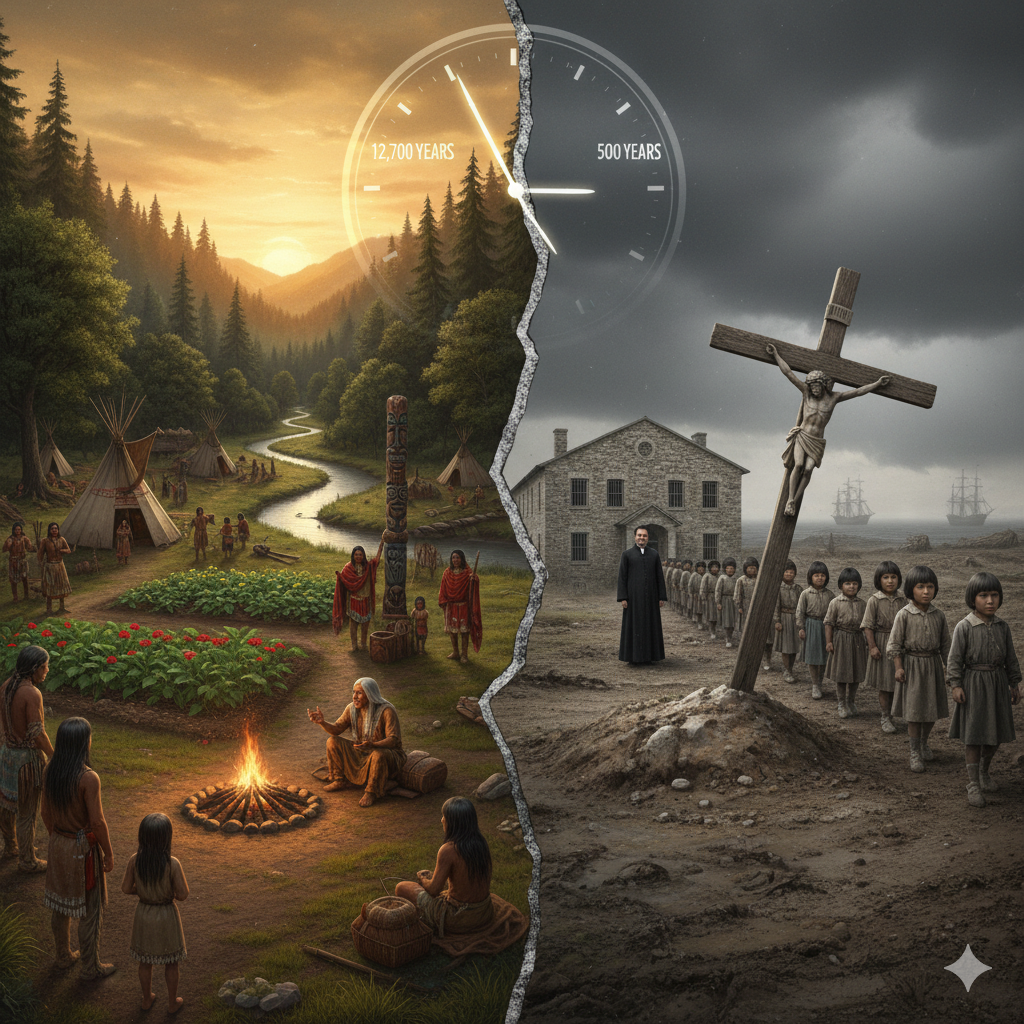
When Two Worlds Collide: The Lasting Scars of European "Discovery" and the Imposition of Christianity on Indigenous North America
Share
For millennia, the vast and diverse continent of North America thrummed with the vibrant life of its Indigenous peoples. For at least 12,700 years – and archaeological evidence continually pushes this timeline further back – countless nations, each with intricate spiritual beliefs, sophisticated governance, sustainable economies, and profound connections to the land, flourished from coast to coast. Their history is one of resilience, innovation, and deep wisdom.
Then, a mere 531 years ago, a new chapter began, violently and irrevocably, with the arrival of European explorers. This chapter, marked by figures like Christopher Columbus and Jacques Cartier, is often framed as "discovery," a heroic narrative of progress. However, for Indigenous peoples, it was the start of an ongoing trauma, profoundly accelerated by the intentional imposition of Christianity and the relentless drive for colonization.
The "Discovery" That Erased: Columbus and the Onset of Cultural Destruction
When Christopher Columbus landed in the Caribbean in 1492, his journal entries reveal a chilling blend of awe and entitlement. He "discovered" lands already inhabited, instantly perceiving the Taíno people as potential converts and laborers. His introduction of Christianity was not an offer of spiritual enlightenment but a precursor to enslavement, disease, and the systematic dismantling of Taíno society. The "Holy Faith" he sought to spread became a justification for brutality, as the Taíno population plummeted from an estimated hundreds of thousands to mere thousands within decades due to disease, forced labor, and violence.
A few decades later, Jacques Cartier's voyages to the St. Lawrence River in the 1530s likewise signaled a new era for the Mi'kmaq and Stadaconan Iroquoians. The planting of crosses was not just a symbolic act of claiming land for France, but a spiritual declaration of war. It asserted the supremacy of one faith over millennia of Indigenous spiritual traditions, laying the groundwork for future French missionary efforts, which would later intensify with the arrival of figures like Samuel de Champlain and the Jesuits.
The Weaponization of Faith: How Christianity Became a Tool of Assimilation
The impact of this forced introduction of Christianity went far beyond mere conversion. It became a central pillar of the colonial project, engineered to dismantle Indigenous cultures from the inside out:
>>The Eradication of Traditional Spirituality: Indigenous spiritual systems were intricate webs of connection to the land, ancestors, and the spirit world, often celebrated through ceremonies, oral traditions, and sacred objects. European missionaries deemed these practices "pagan" or "satanic," actively suppressing, destroying, and outlawing them. Spiritual leaders were targeted, and profound cultural knowledge was lost or driven underground. This severed the spiritual heart of communities, creating a void intended to be filled by the colonizer's faith.
>> Dismantling Social and Political Structures: Missionaries often worked hand-in-hand with colonial authorities to undermine the authority of traditional chiefs, councils, and matriarchs. By promoting European-style governance and patriarchal gender roles, they disrupted the balance of power within Indigenous nations. Women, who often held significant political, economic, and spiritual influence in many Indigenous societies, saw their roles diminished under the influence of European Christian norms.
>> Cultural Genocide through Education: The Residential/Boarding School System: The most devastating tool of Christian assimilation emerged in the 19th century: the Indian Residential School (Canada) and Indian Boarding School (US) systems. Operated primarily by various Christian denominations (Catholic, Anglican, Methodist, Presbyterian, etc.), these institutions had the explicit goal to "kill the Indian in the child." Children were forcibly removed from their families, forbidden to speak their languages, practice their cultures, or wear traditional clothing. They endured horrific physical, emotional, and sexual abuse, leading to intergenerational trauma that persists to this day. The goal was to replace Indigenous identity with a Euro-Christian one, eradicating Indigenous languages, family structures, and spiritual connections to the land.
>> Demoralization and Vulnerability: The sudden onset of devastating European diseases, to which Indigenous peoples had no immunity, caused catastrophic population declines. When traditional healers and spiritual practices struggled against these unseen forces, it created a profound spiritual crisis and a sense of vulnerability, sometimes exploited by missionaries who presented Christianity as the only salvation.
Reclaiming History: Why We Must Re-evaluate Columbus and Colonial Narratives
The traditional celebration of figures like Christopher Columbus as heroic "discoverers" is not merely outdated; it is deeply disrespectful and profoundly ignorant of the realities faced by Indigenous peoples. Celebrating Columbus Day, for example, is to celebrate the initiation of:
* Genocide: The decimation of Indigenous populations through disease, violence, and forced labor.
* Cultural Erasure: The systematic attempts to obliterate Indigenous languages, spiritual practices, and social structures.
* Colonialism and Land Theft: The justification for claiming Indigenous lands and resources.
To celebrate these "discoveries" is to ignore the over 12,700 years of thriving Indigenous civilizations that existed before European arrival, and the mere 531 years of European influence that brought immense suffering. It trivializes the ongoing struggles for justice, sovereignty, and cultural revitalization that Indigenous communities continue today.
Towards a More Just Future
Understanding the true historical impact of European exploration and the imposition of Christianity is not about erasing history; it's about telling a more accurate, inclusive, and ethical one. It requires:
* Recognizing Indigenous Sovereignty: Acknowledging the inherent rights and self-determination of Indigenous nations.
* Decolonizing Narratives: Challenging Eurocentric historical accounts and amplifying Indigenous voices and perspectives.
* Supporting Reconciliation: Actively working towards healing the wounds of the past through initiatives that support Indigenous languages, cultures, and well-being.
The land we now call North America was never "discovered." It was, and remains, the homeland of Indigenous peoples. It is time we honored their history, acknowledged their enduring presence, and ceased celebrating the very figures who initiated centuries of profound suffering and cultural upheaval. Our collective future depends on understanding and confronting the uncomfortable truths of our past.
